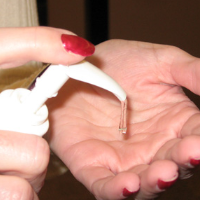Is Risk of Alzheimer’s Increased by Excess Cleanliness?
 (photo: Minnesota Public Radio)
(photo: Minnesota Public Radio)
Working extra hard to limit germs in order to improve health may have the opposite effect, a new study shows.
Cambridge evolutionary biologist Molly Fox and other researchers say excessive cleanliness may increase the chances of developing Alzheimer’s, based on their study of diseases in developed and developing nations.
They looked at countries with large rural populations and high rates of infectious disease where residents come into contact with more microbes as a result of poor water sanitation systems.
Then they compared those countries’ rates of Alzheimer’s disease with those of developed countries, while also adjusting for life expectancy.
The researchers concluded that differences in levels of sanitation, infectious disease and urbanization accounted statistically for about a third of the discrepancy in Alzheimer’s rates between countries.
In other words, people need to be exposed to enough bacteria so their immune systems can fully develop and fight off disease, which doesn’t happen in countries obsessed with hand sanitizers and other germ-killing methods.
“In the modern developed world, we live in hygienically sanitized environments, and as a result we’re not in contact with animals, feces and mud, which would have been the norm for the vast majority of human history,” Fox said in a video about the findings, published in Evolution, Medicine and Public Health.
-Noel Brinkerhoff
To Learn More:
Is the Developed World So Hygienically Clean That It’s Making Us Sick? (by Cameron Scott, Singularity Hub)
Hygiene and the World Distribution of Alzheimer’s Disease (by Molly Fox, Leslie A. Knapp, Paul W. Andrews and Corey L. Fincher, Evolution, Medicine, and Public Health)
- Top Stories
- Unusual News
- Where is the Money Going?
- Controversies
- U.S. and the World
- Appointments and Resignations
- Latest News
- Trump Orders ICE and Border Patrol to Kill More Protestors
- Trump Renames National Football League National Trump League
- Trump to Stop Deportations If…
- Trump Denounces World Series
- What If China Invaded the United States?






Comments